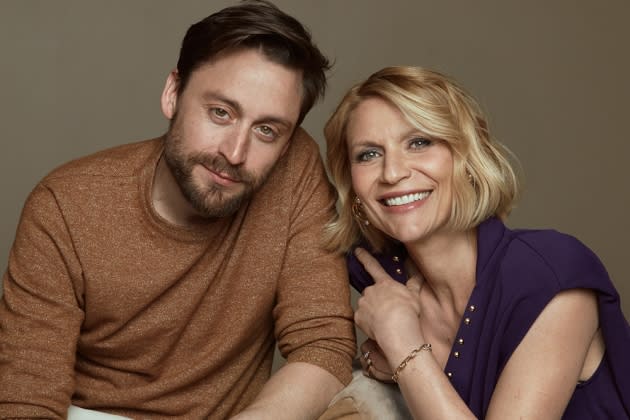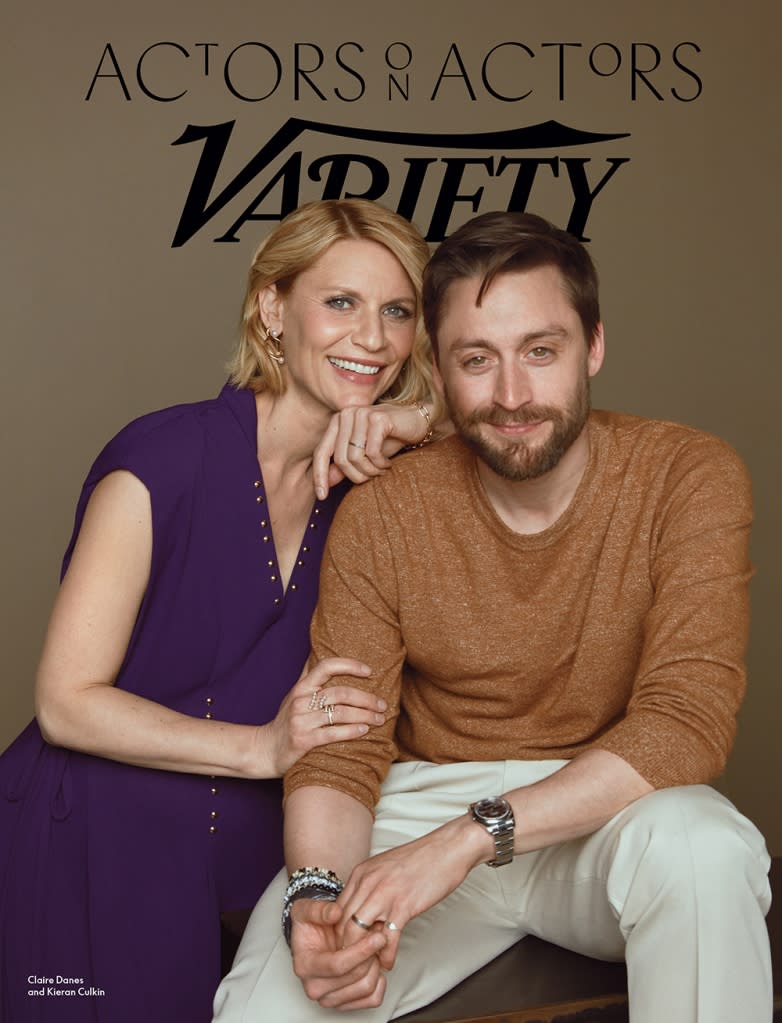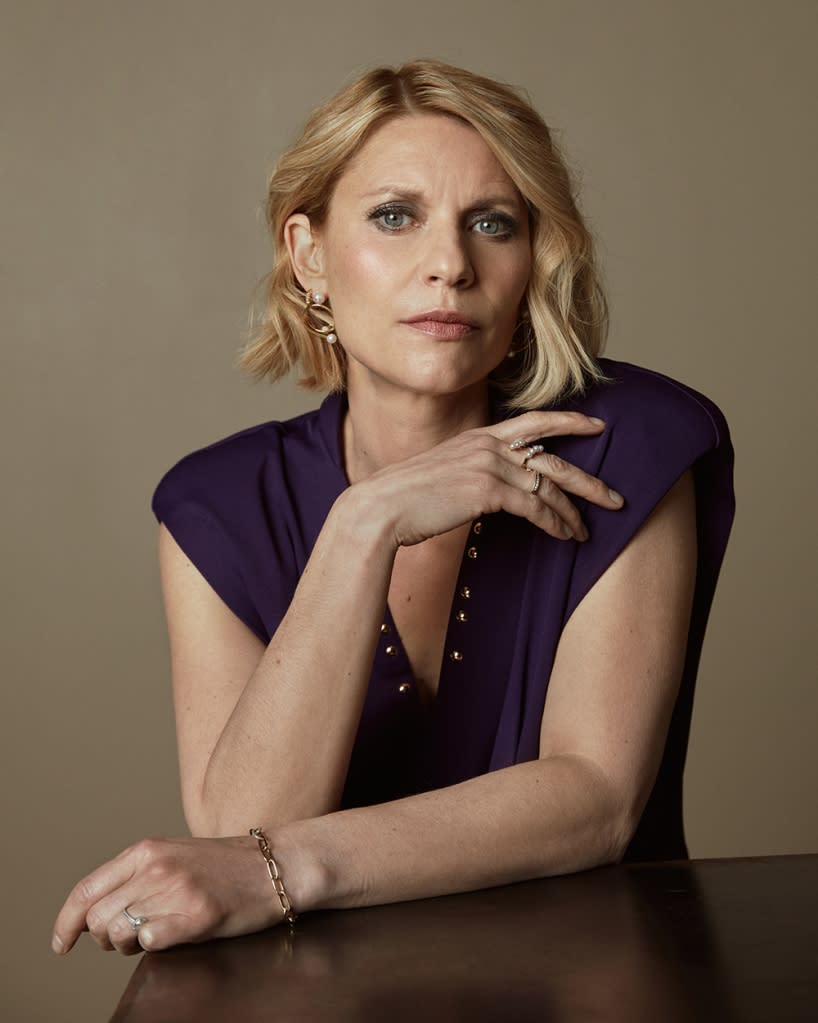Kieran Culkin Begs Claire Danes to ‘Stop Making Me Cry So Much’ as They Discuss ‘Fleishman,’ ‘Succession’ Creator’s Season 5 Pitch and More
- Oops!Something went wrong.Please try again later.
- Oops!Something went wrong.Please try again later.
- Oops!Something went wrong.Please try again later.
- Oops!Something went wrong.Please try again later.
- Oops!Something went wrong.Please try again later.
- Oops!Something went wrong.Please try again later.

Kieran Culkin and Claire Danes worked together on Burr Steers’ 2002 indie “Igby Goes Down,” in which Culkin played the angst-ridden 17-year-old title character to Danes’ slightly older Manhattan socialite Sookie Sapperstein. All these years later, Danes is visibly pregnant, and they chat like old pals about the difficulty of naming her third child with Hugh Dancy. “‘Cyrus,’ we came to pretty readily. ‘Rowan,’ we had to fight harder for. This one is impossible,” she says.

“I realized the movie you and I did together is over half of our lives ago,” Culkin says.
More from Variety
“It’s very nice to see you again,” Danes replies wryly, “in our midlives.”
But the two actors have serious business to discuss, with Culkin convincingly telling Danes that her show “Fleishman Is in Trouble” — particularly her portrayal of Rachel — “helped my marriage.” In Taffy Brodesser-Akner’s limited series, Danes’ Rachel Fleishman appears to be the careerist ex-wife of Toby Fleishman (Jesse Eisenberg), with whom she has ditched their kids. But that’s just how it seems until the show’s perspective shifts in its devastating seventh episode, when you see a version of the same story from Rachel’s point of view. Culkin says he’s watched that episode, in which Danes’ character memorably screams her pain out, three times.
And then there’s the wee topic of “Succession,” which concluded on May 28. In the series finale, Culkin’s tragicomic character, Roman Roy, ended up alone in a bar, drinking a martini, his face recovering from a beating. Having not seen that episode yet, “Succession” super fan Danes instead quizzes Culkin about when he learned that the show’s creator, Jesse Armstrong, was ending the HBO drama; what it was like filming the season’s instant-classic third episode, in which patriarch Logan Roy (Brian Cox) dies suddenly; and what in the world was happening between Roman and Gerri (J. Smith-Cameron).
KIERAN CULKIN: Something like 22 or more years ago, we shot “Igby Goes Down.”
CLAIRE DANES: That’s insane. But I had a really good time on that movie.
CULKIN: So did I.
DANES: You had heavier lifting, though. You were carrying that beast.
CULKIN: I was terrified. That was when I first started to develop whatever sort of process that I would eventually have. Burr Steers had me memorize the entire script for weeks. I had everybody’s lines in my head before we even started the rehearsals.
DANES: Wow.
CULKIN: And he was hesitant to hire me, because I’d worked as a child, and he was like, “Child actors develop really bad habits that they tend to carry on in their adulthood.”
DANES: Eye roll! I mean, I kind of understand, but I think bad kid actors develop bad habits.
CULKIN: I was a pretty bad kid actor, I think.
DANES: No, I don’t believe it! Not for a second.
So when you started your fourth and final season of “Succession,” were you aware that it was the final?
CULKIN: Not really.
DANES: What does that mean?

CULKIN: It means Jesse Armstrong, our showrunner-writer, didn’t know. He told me before the season started that he thinks this is the end, but he doesn’t know. I’d actually stopped asking what was coming later. And that was the thing: I liked it. I liked not knowing! And then this year, he mentioned that it might be the end before we started shooting, so I started asking him questions. He told me what happens with Logan, and I asked him to break down everything. And he explained the entire season to me. And then when he got to the end, I said, “Well, that seems like that’s the end of the show.” And he goes, “Yeah, it does, doesn’t it? Although …” And then he just started talking about all these different ideas off the top of his head.
DANES: He’s a really good writer.
CULKIN: He is. And he was like, “This is just off the top of my head.” And then he just pitched an amazing fifth season and then another and another.
DANES: And then denied them to you.
CULKIN: Then denied. He kept us guessing the whole time. There were some of us that were so sure that there was not going to be another season. Sarah Snook, the entire time, until the very end was like, “There’s going to be a fifth season.” And had very clear ideas on what it was. And it was after the table read for the final episode, he told us.
DANES: Did he tell you why?
CULKIN: He felt like the story was complete, and creatively that was it? He’s like, “I feel like it’s complete.” I feel like he’s satisfied as a writer.
DANES: I’ve loved everything that you’ve been doing as Roman. What does your dad call you?
CULKIN: Romulus, sometimes.

DANES: At the end of the third season, when you’re having to confront your father, you’re so dysregulated. It starts in the car, and when you face him in that room, it was just wrenching. It was so poignant. And you really felt like you were a terrified kid.
CULKIN: Child.
DANES: You were such a child, really. That was so well done.
CULKIN: I realize I’m doing it right now for some reason. Whenever I have to shoot with Brian, it’s like, “Dad, I feel like I’m 7.” He can be a scary guy. Not to me — I can approach him as an adult. But for whatever reason, in character, I feel like I’m 7 with him.
DANES: I was gutted by that. And then, again, obviously the episode.
CULKIN: The episode, yes. Which sort of felt like the episode as we were doing it.
DANES: Did it?
CULKIN: It did. The way the second episode ends with Roman’s being invited in — it looks like Roman’s actually going to go with Dad and go against the siblings. But it’s sort of on the fence. The way that episode starts off, with Dad calling Roman and saying, “You need to fire Gerri,” I feel like Roman feels like he’s having the worst day of his professional life, and maybe one of the worst days of his life. He has no idea how bad it’s going to get.
DANES: OK, so can we just talk about Gerri for just a second? I’m just wondering if the writing made full sense of what that was.
CULKIN: I never did. But I knew that it made sense. Something in my belly said, “Yeah. This is working. I don’t know what it is or why.” And if I tried to identify it, I feel like Roman wouldn’t be able to identify it. So I tried to remain in the dark. I sort of thought, “When the show’s over, I can figure it out” — and I still haven’t.
DANES: I mean, I guess it’s Oedipal. The show is so fun. It’s this mythic quality, and Dad asks you to kill Mommy.
CULKIN: And then I have to! I leave him a horrible voicemail — I don’t know if he heard it or not. And I’ll never know, I think. And the way we shot that. I mean, we’re on a freaking boat, daylight dependent, and we’ve got to move fast. We don’t do a lot of rehearsing anyway, but there’s so many moving pieces and characters and things happening to each individual. And it was just sort of “Go!” And don’t think about it too much. Don’t talk about it too much. When you started working on “Fleishman Is in Trouble,” that’s just a miniseries — have you done that before?
DANES: I have done, now, three limited series. And they’re tough! They’re kind of worst of both — film and episodic. You don’t have the history or the trust or the camaraderie, but you have all that uncertainty. And it takes forever to lay that much material down. “Fleishman” was different. But I did a limited series called “The Essex Serpent,” where I was kind of in everything, and by the end of it, I was devastated. My body was breaking down. I was exhausted. And I was confused by it because, I have to say, I can cope with plenty and think of myself as pretty resilient. With “Fleishman,” I disappear for quite a while. Most of my stuff comes at the end. And we actually shot that in the beginning, for kind of curious reasons.
CULKIN: Wait, the seventh episode you shot at the beginning?
DANES: Yeah. And that was wild, because we were shooting the same exact scenes, but from slightly different vantage points. So it was an amazing exercise. And the shifts were kind of discrete and nuanced, which was more interesting and harder. I’d never played a character as seen by somebody else before — the version of the person through the embittered husband’s filter. I’ve only played the authentic expression of the thing. So to go back and forth was a little disorienting.
CULKIN: As a viewer, it was interesting for me to watch. And I swear that this show helped my marriage.
DANES: Really?
CULKIN: I do. There’s a line in the show, something to the extent of, “There’s one person’s point of view, and then there’s the boiling abyss between them, and then the other person’s point of view.” As I was watching it, I was like, “This is his perspective.” But “Come on, Rachel — step your game up a little bit! You’re going through a hard time, but come on, you’re kind of a nightmare to this family.” That was why that episode hit me so hard. I’ve watched it three times now, and it devastates me. Toby is just completely unaware. He’s just not listening. I just wanted to say, “Could you just go in there, suck it up and just say, ‘Hey, I’m really sorry you’re going through it,’ and just listen or something?”
DANES: Well, that’s the conceit of the novel too. And it’s very effective. My best friend dragged me to a bookstore, bought the book for me and shoved it in my purse. And said, “You have to read this, because I need to talk to you about the ending.” I was doing reshoots for “The Essex Serpent” that takes place in Victorian England. I was in a corset, and it was my set book. Then I got this offer, which was weird. Like a little uncanny. Taffy Brodesser-Akner, the writer of the novel and the series, really tests the patience of the reader, and the viewer. You’re in kind of stagnant Toby waters for a while. You’re just hearing him gripe. I was about to give up, and then I got this offer and I thought, “OK, well, I guess I have to push through and finish.” And then was so rewarded, because it’s such a wild reveal that I certainly didn’t anticipate. I mean, to be fair to Toby, she’s not able to realize how fragile she is. Or she has no clue, the level of trauma.
CULKIN: My wife said that it was the most accurate depiction of postpartum she’d seen. It’s not just a really bad birth story. This is trauma.
DANES: Right. It’s trauma that’s been compounded by years of other horrible experiences. She had this very rocky foundation.
CULKIN: Then you actually get the chance to, as the character, scream that out.
DANES: Yeah, that we only did in one take.
CULKIN: No!
DANES: I felt so held by Taffy and her work and our directors that I was very — I mean, I wouldn’t say it was joyful. But I was engaged. And I felt like I really loved what we were attempting to do together. And it was a reality that had not been rendered all that often.
CULKIN: I would agree. I haven’t seen anything like it. It comes through. And I just want to say it’s one of the greatest performances I’ve seen in maybe television, but possibly ever.
DANES: Kieran, thank you.
CULKIN: Stop making me cry so much. I’m going to stop watching your work. I hate crying, so stop it! Stop moving me so much.
Set Design: Lucy Holt; Production: Alexey Galetskiy/AGPNYC
Best of Variety
'House of the Dragon': Every Character and What You Need to Know About the 'Game of Thrones' Prequel
25 Groundbreaking Female Directors: From Alice Guy to Chloé Zhao
Sign up for Variety’s Newsletter. For the latest news, follow us on Facebook, Twitter, and Instagram.

